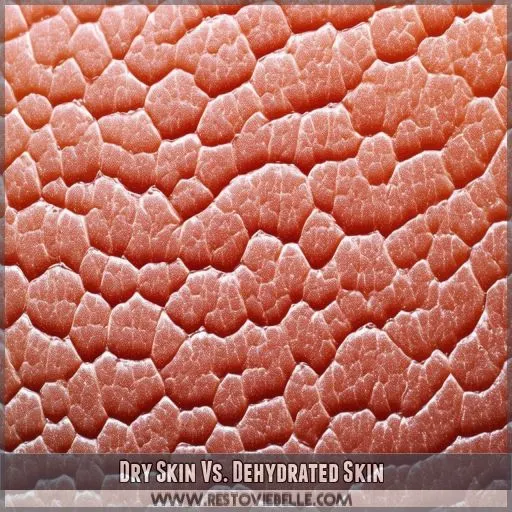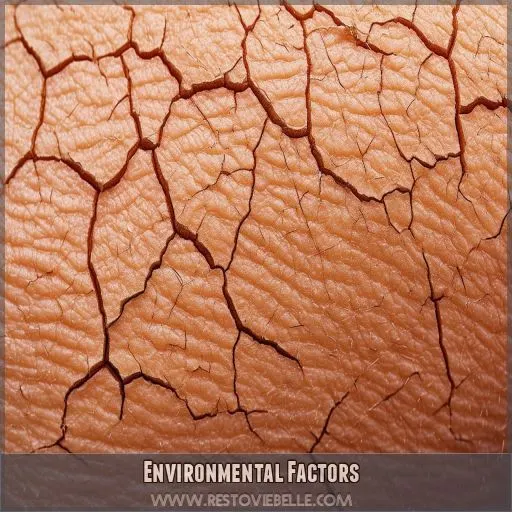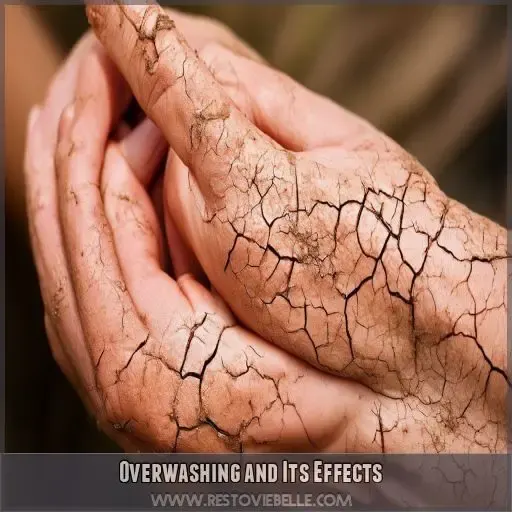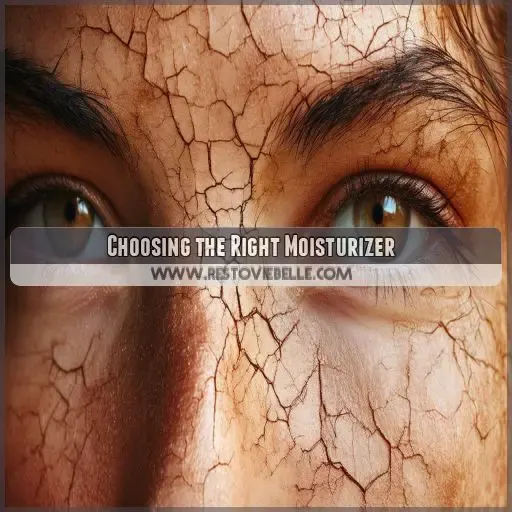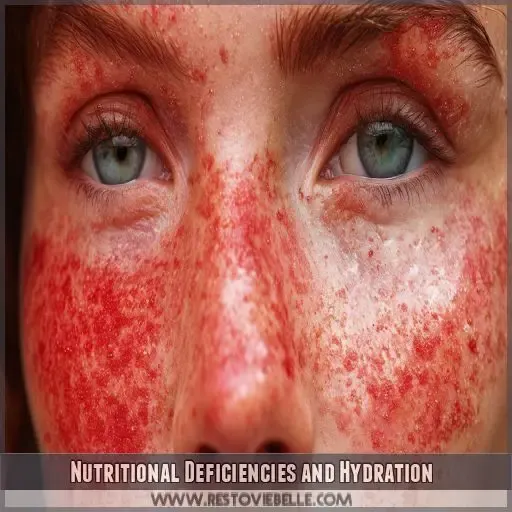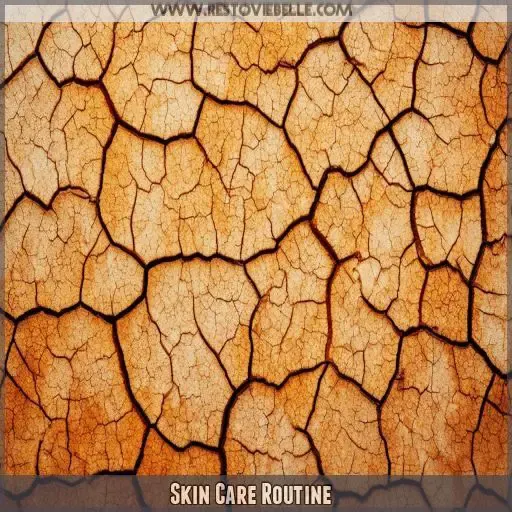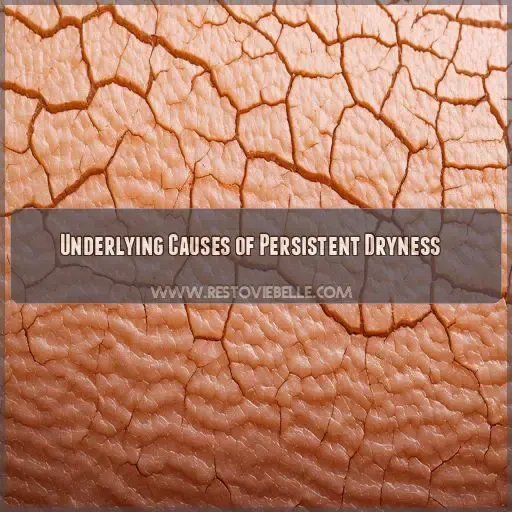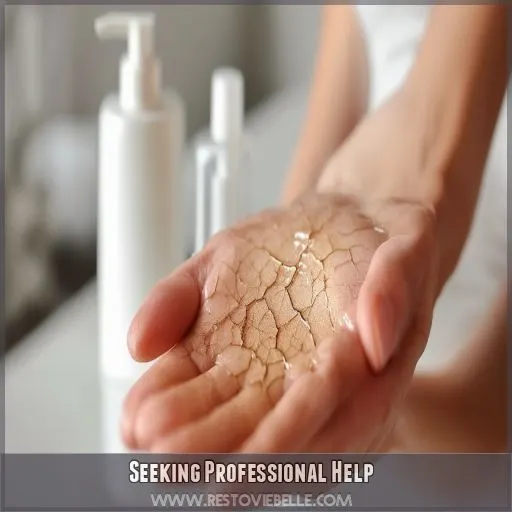This site is supported by our readers. We may earn a commission, at no cost to you, if you purchase through links.
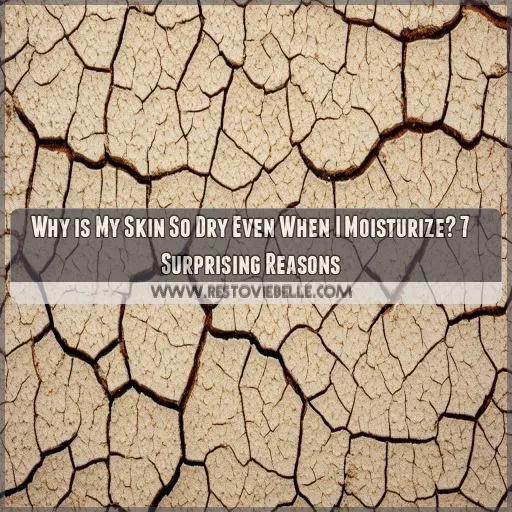
The secret lies in understanding the complex factors of skin hydration, varying from environmental influences to hidden nutritional deficiencies to a couple of surprising reasons—things you might not suspect are making your skin so dry.
This article discusses seven reasons why your skin could be so dry despite having applied moisturizer. Also, it gives you insight into how you can finally have that smooth, hydrated complexion you’ve been dreaming of
Table Of Contents
- Key Takeaways
- Why is My Skin So Dry Even When I Moisturize?
- Dry Skin Vs. Dehydrated Skin
- Environmental Factors
- Overwashing and Its Effects
- Choosing the Right Moisturizer
- Nutritional Deficiencies and Hydration
- Skin Care Routine
- Underlying Causes of Persistent Dryness
- Seeking Professional Help
- Frequently Asked Questions (FAQs)
- Why is my skin so dry no matter how much I moisturize?
- Why isn’t moisturizer helping my dry skin?
- What am I lacking when my skin is so dry?
- Why is my skin not retaining moisture?
- Why does my skin dry out a lot?
- Why is my skin dry and dull in certain spots?
- Why does my skin feel dry after a moisturizer?
- Do you have dry skin despite moisturizing your skin regularly?
- Can stress contribute to dry skin?
- How does aging affect skin moisture?
- Are there specific fabrics that irritate dry skin?
- Can medications cause dry skin?
- What role do genetics play in dry skin?
- Conclusion
Key Takeaways
- Your skin might be crying out for more than just a slap of lotion! Factors like overwashing, harsh products, and even that sneaky winter weather can leave you feeling drier than the Sahara, no matter how much you moisturize.
- Don’t judge a moisturizer by its cover – or its price tag! Finding the right product for your skin type is like dating – you might have to kiss a few frogs before you find your prince. Look for ingredients like hyaluronic acid and ceramides to give your skin the royal treatment it deserves.
- Your dry skin might be sending an SOS from the inside out. Nutritional deficiencies and dehydration can turn your skin into a thirsty sponge, so don’t forget to hydrate and nourish from within. Who knew that glass of water could be your skin’s new best friend?
- If your skin’s still playing hard to get despite your best efforts, it might be time to call in the big guns. A dermatologist can help you crack the code on your stubborn dryness and get your skin glowing like an Instagram filter come to life
Why is My Skin So Dry Even When I Moisturize?
If you’re wondering why your skin is so dry even when you moisturize, several factors could be at play.
You might be using the wrong type of moisturizer for your skin, or environmental conditions like cold weather and low humidity could be stripping your skin of moisture.
Overwashing or using harsh cleansers can disrupt your skin’s natural barrier, making it harder to retain hydration. Nutritional deficiencies or dehydration can also contribute to persistent dryness.
It’s important to distinguish between dry and dehydrated skin, as they require different treatments.
Dry Skin Vs. Dehydrated Skin
You might be surprised to learn that dry skin and dehydrated skin aren’t the same thing. Dry skin is a skin type characterized by a lack of oil, while dehydrated skin results from a lack of water. If you have dry skin, you’ll likely experience consistent dryness, especially in winter. Dehydrated skin, on the other hand, can come and go.
To address these issues, you’ll need different approaches. For dry skin, focus on replenishing oils with a moisturizer rich in nourishing ingredients like ceramides or fatty acids. Dehydrated skin craves hydration, so look for products containing hyaluronic acid or glycerin.
Your care routine should adapt to your skin’s needs. Pay attention to how your skin feels and adjust accordingly. Remember, proper hydration isn’t just about what you put on your skin – it’s also about what you put in your body!
Environmental Factors
Environmental factors play a significant role in skin dryness, even when you moisturize regularly. Heat from hot showers or heaters can strip your skin of natural oils, while cold weather and low humidity can lead to moisture loss and increased skin irritation
Impact of Heat
Heat can wreak havoc on your skin, leaving it dry, itchy, and flaky. When exposed to warmth, your skin loses moisture rapidly, leading to a compromised barrier function. This can trigger a cycle of dryness and irritation. To combat heat-induced skin issues:
- Use a humidifier to add moisture to the air
- Apply a light, non-comedogenic moisturizer frequently
- Stay hydrated by drinking plenty of water
Effects of Cold Weather
While heat can dry out your skin, cold weather is equally harsh. Winter’s low humidity and biting winds can lead to dry patches and the dreaded "winter itch."
Your skin’s protective barrier weakens, making it susceptible to windburn. Don’t forget your lips – they’re especially vulnerable.
Combat these dry skin causes by applying a rich moisturizer and lip balm regularly, and consider using a humidifier indoors
Overwashing and Its Effects
Overwashing your face can strip away the natural oils that keep your skin healthy and hydrated. This can lead to dryness, tightness, and irritation. Even if you have oily or acne-prone skin, washing more than twice a day isn’t recommended. Instead, focus on using a gentle cleanser that suits your skin type.
- Signs of overwashing: Dryness, tightness, increased oiliness, and breakouts.
- Frequency: Limit face washing to once or twice daily.
- Temperature: Use lukewarm water to avoid further irritation.
- Cleanser ingredients: Avoid harsh ingredients like sulfates and alcohol.
If your skin feels dry even after moisturizing, consider reducing your washing frequency and switching to a milder cleanser
Choosing the Right Moisturizer
To choose the right moisturizer, you’ll need to understand your skin type and the key ingredients that address your specific concerns. Consider adjusting your moisturizer seasonally, as your skin’s needs may change with temperature and humidity fluctuations
Know Your Skin Type
To choose the right moisturizer, you first need to know your skin type. Dry skin feels tight and may flake, while oily skin appears shiny. Combination skin has both oily and dry areas, and sensitive skin reacts easily to products. Identifying your skin type helps you select a moisturizer that addresses your specific needs, ensuring effective hydration and care (Source)
Key Moisturizing Ingredients
To keep your skin hydrated and healthy, it’s crucial to choose moisturizers with the right ingredients. Look for products that contain:
Hyaluronic Acid: Hydrates and retains moisture.
- Glycerin: Attracts water into the skin.
- Ceramides: Strengthen the skin barrier.
- Niacinamide: This helps reduce the water loss and soothing the skin.
- Shea Butter: Deeply moisturizes and melts away dryness on the skin [32 ].
Seasonal Moisturizer Adjustments
As seasons change, so should your moisturizer. In winter, you’ll need a heavier cream to combat dry air, while summer calls for a lighter lotion.
Be careful not to over-moisturize, as this can weaken your skin’s natural moisture barrier.
If your skin feels greasy or you’re breaking out, you might be using a moisturizer that’s too heavy. Adjust accordingly to keep your skin balanced year-round
Nutritional Deficiencies and Hydration
You might be surprised to learn that your dry skin could be a sign of what’s happening inside your body. Dehydration and malnutrition have been found to tarnish your skin completely, making it dry even when you’re observant of moisturizing.
Are you drinking enough water? Aim for at least eight glasses daily to keep your skin hydrated from the inside out. But it shouldn’t only be all about H2O.
Besides being hydrated, your diet is vital. Deficiencies in vitamins, especially A, C, and E, can lead to dry, flaking skin. Not to be left behind are minerals such as zinc and selenium. As far as skin health is concerned, they’re of equal importance.
And can you believe this? Not receiving enough protein can also lead to dry skin. Next time your skin is drier than the Sahara, perhaps it’s time to look closer at your plate. Maybe it’s your skin calling for some nutritional TLC!
Skin Care Routine
Your skincare routine might be the culprit behind your persistently dry skin. Exfoliation is key, but overdoing it can strip away natural oils. Aim to exfoliate twice weekly, using gentle products that won’t irritate your skin. When choosing ingredients, look for hydrating components like hyaluronic acid and ceramides. If your current cleanser is too harsh, consider alternatives like micellar water or oil-based cleansers.
To boost hydration, incorporate these steps into your routine:
- Apply a hydrating mask once a week
- Use a facial oil before your moisturizer
- Pat your skin dry instead of rubbing
Underlying Causes of Persistent Dryness
You might be surprised to learn that persistent dryness can stem from underlying causes beyond just lack of moisturizer. Skin barrier damage, harsh cleansers, and nutritional deficiencies can all contribute to your skin’s struggle to retain moisture, even when you’re diligent about applying lotions
Underlying Causes of Persistent Dryness
Persistent dryness can stem from several factors. Excessive exfoliation strips away natural oils, leading to dry, irritated skin (Source). Using expired moisturizers can also cause irritation and dryness . Harsh skincare products, like those containing alcohol or sulfates, can damage your skin barrier, making it difficult to retain moisture . Additionally, lack of hydration and nutritional deficiencies can exacerbate dry skin (Source)
1. Skin Barrier Damage
Your skin barrier is critical for skin moisture retention and protection from external factors. If it’s disrupted, this may lead to lingering dryness that persists even after moisturizing. Here are three common causes that can damage a skin barrier:
- Over-washing: Over-washing depletes necessary natural oils.
- Over-Exfoliation: Over-exfoliation damages the barrier.
- Dehydration: Water intake deficiency weakens the barrier
harsh cleansers
You might be sabotaging your skin with harsh cleansers. Many popular products contain sulfates, alcohol, and parabens that strip away natural oils, leaving your skin parched.
Opt for sulfate-free, alcohol-free, and paraben-free cleansers with gentle ingredients. Become an ingredient detective – scrutinize those labels!
it struggles to retain moisture
Even with harsh cleansers eliminated, your skin might still struggle to retain moisture due to underlying issues. Exfoliation, over-moisturizing, dehydration, medications, and certain conditions can disrupt your skin’s natural barrier function. This compromised barrier** leads to:
- Moisture evaporating quickly from your skin
- Essential oils being stripped away
- Increased sensitivity to irritants
- Difficulty absorbing beneficial ingredients
Understanding these factors can help you address the root cause of your persistent dryness and develop a more effective skincare routine
2. Inappropriate Moisturizer
Even with a damaged barrier, using the right moisturizer can make a difference. You might be using an unsuitable formula for your skin type or applying it incorrectly.
Heavy creams can clog pores, while lightweight lotions might not provide enough hydration. Consider your skin’s needs and the season. For example, you’ll need richer moisturizers in winter.
Experiment with different formulas to find what works best for you
3. Dehydration and Malnutrition
Your skin’s health isn’t just about what you put on it but also about what’s going on inside of your body. Dehydration and malnutrition can make your skin dry, despite moisturizing religiously.
Make sure to drink enough water daily and get sufficient nutrients. Consider adding in a multivitamin to support skin health
C
You just maybe haven’t thought about why your dry skin won’t go away: how often you exfoliate is everything.
Over-exfoliation will break that barrier; under-exfoliation just lets dead cells block moisture in.
Moisturizers that are past their expiration date can even irritate rather than hydrate.
Severe ingredients of cleansers strip your natural oils, compromising the skin’s barrier.
Targeted care in a repair plan will sort this out properly
D
You might be over-exfoliating, causing skin irritation and barrier damage. This can lead to poor moisturizer absorption, leaving your skin feeling dry despite your efforts. Incorrect exfoliation techniques or frequency can strip away natural oils, making it harder for your skin to retain moisture. Additionally, overapplying moisturizer can actually hinder absorption, leaving your skin feeling dry and potentially clogging pores
and E
Similar to its antioxidant counterpart, vitamin C, vitamin E appears to be fabulous for dry skin. It, too, serves as a potent antioxidant that protects your skin cells from free radical damage.
Ensure that any lotions or body butter contain vitamin E to complement your skin’s moisture-retaining properties.
Ingredient awareness is critical to better skin health. Support this effort with mild cleansers and applying moisturizers daily for complete hydration
can help maintain skin moisture
You’ve probably heard that vitamins C, D, and E are skin superheroes, right? Well, they’re not just hype! These powerhouse nutrients can help your skin retain moisture like a champ.
Ceramide moisturizers and treatment masks are your secret weapons here. They work to strengthen your skin’s barrier, locking in hydration and keeping dryness at bay.
It’s like giving your skin a protective shield against moisture loss!
Seeking Professional Help
If you’ve tried everything and your skin still insists on being dry, this is the point where you need to seek professional consultation. A dermatologist will now provide a schedule or routine for treatment most suitable for your skin and any necessary curative measures. Here are some signs you might want to visit a dermatologist:
- Ongoing Dryness: If the problems persist and your skin still feels dry after using moisturizers and trying some home remedies, then the dermatologist should examine and treat the conditions.
- Serious Symptoms: Cracked, bleeding, or painful skin means you’ll likely need prescription treatments.
- Chronic Itching: Perpetual scratching can lead to infections, and infection is something to be looked at.
- Skin Conditions: Conditions such as eczema or psoriasis need relevant and specialized handling.
- Unresponsive Skin: If your skin is unresponsive to common over-the-counter remedies, professional advice is critical.
A dermatology consultation will revitalize your skin and smooth out your skincare routine.
Frequently Asked Questions (FAQs)
Why is my skin so dry no matter how much I moisturize?
You’re likely overwashing, using harsh products, or not exfoliating properly. Your moisturizer might be inadequate or expired. Dehydration or nutrient deficiencies can also cause persistent dryness. Consider adjusting your skincare routine and consulting a dermatologist for personalized advice
Why isn’t moisturizer helping my dry skin?
Imagine slathering on lotion, yet your skin’s still parched. You’re not alone. Your moisturizer mightn’t be addressing the root cause. It could be overwashing, using harsh products, or dehydration. Consult a dermatologist for personalized solutions
What am I lacking when my skin is so dry?
You might be lacking essential nutrients, hydration, or proper skincare techniques. Your skin’s barrier could be compromised, or you may be using products that don’t suit your skin type. Consider your diet, water intake, and skincare routine
Why is my skin not retaining moisture?
Your skin’s like a sponge that’s lost its squeeze. Damaged barriers, harsh products, or dehydration could be the culprits. You’re moisturizing, but it’s not sticking. Consider gentler cleansers, barrier-repairing ingredients, and upping your water intake
Why does my skin dry out a lot?
This may result from harsh cleansers, over-washing, not exfoliating enough, or even dehydration. Weather conditions can give you dry skin due to the cold weather or the dryness caused by indoor heating. Just remember proper skincare products and good hydration to help combat dryness.
Why is my skin dry and dull in certain spots?
Your skin’s a patchwork quilt, with some spots feeling like the Sahara. Uneven dryness often stems from inconsistent moisturizing, environmental factors, or localized skin conditions. Try spot-treating trouble areas with targeted hydration for a smoother, more radiant complexion
Why does my skin feel dry after a moisturizer?
Your skin might feel dry after moisturizing if you’re using the wrong product, over-exfoliating, or exposing your skin to harsh conditions. Try switching to a richer moisturizer, exfoliating less, and protecting your skin from environmental stressors
Do you have dry skin despite moisturizing your skin regularly?
You’re not alone in this frustrating struggle. Despite regular moisturizing, your skin may still feel dry due to factors like overwashing, harsh products, or dehydration. Let’s explore why this happens and how you can achieve that coveted hydrated glow
Can stress contribute to dry skin?
Yes, stress can contribute to dry skin. It triggers hormonal changes that disrupt your skin’s barrier function and oil production. You’re also more likely to neglect your skincare routine when stressed, further exacerbating dryness
How does aging affect skin moisture?
As you age, your skin produces less oil and loses moisture more easily. Your skin’s barrier function weakens, making it harder to retain hydration. This natural process can lead to dryness, even with regular moisturizing
Are there specific fabrics that irritate dry skin?
You’ll want to avoid rough fabrics like wool and synthetic fibers. They can irritate dry skin, causing itching and flaking. Instead, opt for soft, breathable materials like cotton, silk, or bamboo to keep your skin comfortable
Can medications cause dry skin?
Up to 50% of medications can cause dry skin as a side effect. You’re likely experiencing this if you’ve recently started new meds. Common culprits include diuretics, statins, and acne treatments. Consult your doctor for alternatives
What role do genetics play in dry skin?
Your genes play a significant role in dry skin. They influence your skin’s natural oil production, moisture retention, and barrier function. If your parents have dry skin, you’re more likely to experience it too
Conclusion
Have you ever wondered why your skin feels dry even after moisturizing? Understanding the complex factors behind skin hydration is key.
From environmental influences to hidden nutritional deficiencies, several surprising reasons can contribute to persistent dryness. By addressing these issues, you can finally achieve that smooth, hydrated complexion you’ve been dreaming of.
Don’t hesitate to seek professional help if your skin concerns persist

